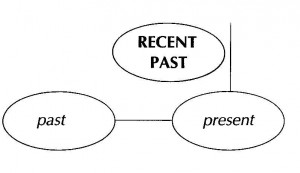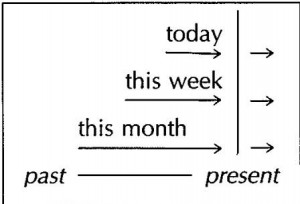Unit 15. Present perfect. I have done. Part 3.
A.
Study this example:

Tom: Have you heard from George? Ann: No, he hasn’t written to me lately.
We use the present perfect when we talk about a period of time that continues up to the present. Tom and Ann are talking about the period between a short time ago and now. So they say “have you heard” and “he hasn’t written.”
|
Here are some more examples:
Have you seen my umbrella? I can’t find it anywhere.
Everything is going fine. We haven’t had any problems so far.
We’ve met a lot of interesting people in the last few days.
Fred has been sick a lot in the past few years, hasn’t he?
I haven’t seen Maria recently. Have you? For sentences with for and since see Unit 18.
B.
We often use the present perfect with yet (see also Unit Unit 103). Yet shows that the speaker is expecting something to happen. Use yet only in questions and negative sentences:
Has it stopped raining yet?
I haven’t told them about the accident yet. You can also use yet with the simple past:
Did it stop raining yet?
I didn’t tell them yet.
(See also Unit 20.)
C.
We use the present perfect with this morning / this evening / today / this week / this semester, etc. (when these periods are not finished at the time of speaking):

I’ve had five cups of coffee today. (Perhaps I’ll have more before the day is over.)
Has Ann had a vacation this year?
I haven’t seen Tom this morning. Have you?
Liz hasn’t studied very much this semester.
Bill is calling his girlfriend again. That’s the third time he’s called her this evening.
D.
We also use the present perfect continuous (I have been doing) when we talk about a period of time continuing up to the present:
I haven’t been feeling very well lately. For the present perfect continuous see Units 16 – 18.
For the present perfect and simple past see Units 19 -20.



